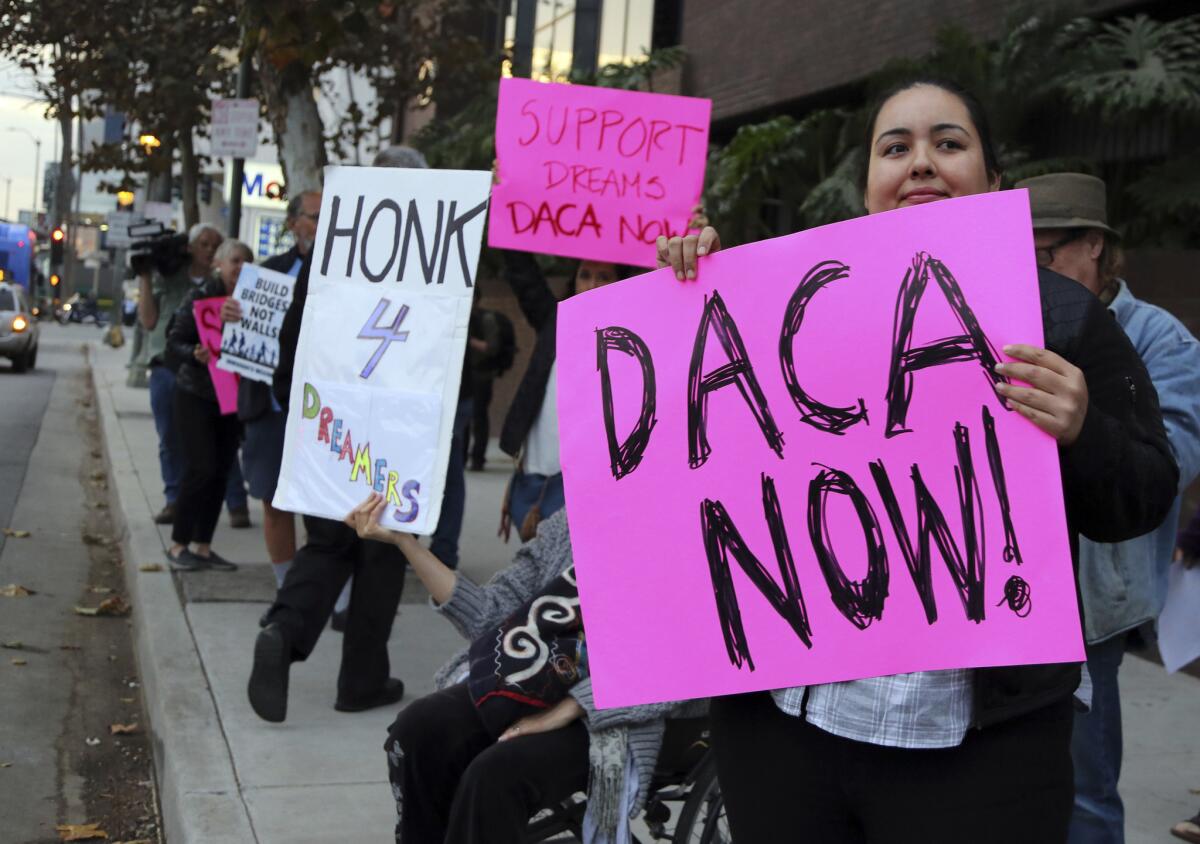Political agenda keeps Trump and Congress apart on a fix for immigrant ‘Dreamers’

President Trump will convene a bipartisan group of lawmakers Tuesday to discuss immigration at the White House, but leaders remain far apart on a resolution to protect nearly 800,000 young people from deportation.
A compromise deal that once appeared within reach — passage of the Dream Act coupled with some enhanced border security measures — now appears to have slipped as the administration backtracks on Trump’s earlier agreement with Democratic leaders and piles on fresh demands.
In the balance are young immigrants brought to the U.S. illegally as children, the so-called Dreamers, who are working, serving in the military or going to school with temporary permits under the Deferred Action for Childhood Arrivals program. They now face deportation under Trump’s plan to end DACA.
Hopes for a quick resolution by Jan. 19 as part of legislation Congress must pass to avoid a government shutdown have dimmed as the administration instead has pushed for a more ambitious rewrite of the nation’s immigration laws.
“Unfortunately, this body still isn’t closer to a legitimate and fair deal that promotes and protects the interests of the American people in a lawful immigration system and provides a fair and equitable solution on DACA,” Sen. Charles E. Grassley (R-Iowa), chairman of the Judiciary Committee, said Monday.
Trump’s meeting at the White House with more than dozen lawmakers is unlikely to resolve the standoff. The president’s ability to cut a deal with congressional leaders has been burdened by his shifting views on immigration and the complexity of an issue that has stymied Congress for decades.
Just a few months ago, Trump tipped his hand early by agreeing to a more limited approach that would protect Dreamers from deportation in exchange for some unspecified border security measures that — according to Democrats — did not include money for a border wall with Mexico.
But he was forced to quickly backtrack from that handshake deal made over dinner with House Minority Leader Nancy Pelosi (D-San Francisco) and Senate Minority Leader Charles E. Schumer (D-N.Y.) amid an outpouring of opposition from far-right supporters, including some from the Republican majority in Congress. They warned him off what was derided as “amnesty.”
Now the Trump administration has presented a long list of demands that look more like the outlines of a comprehensive immigration overhaul package than a quick fix to protect Dreamers. It includes $18 billion for his promised border wall with Mexico.
“The wall is going to happen or we’re not going to have DACA,” Trump said over the weekend after a retreat with GOP leaders. He also called for provisions to end the visa lottery system and a program that gives priority to family members of immigrants already in the U.S.
Democrats, under enormous pressure from immigration advocates not to bargain over Dreamers, are holding firm against the White House, and some lawmakers will probably withhold their votes from the must-pass spending bill unless it includes DACA protections.
But Democrats’ leverage may weaken as talks drag closer to the funding deadline. Even though the Republican majority often splits over money bills and needs Democratic votes for passage, not all Democrats are willing to risk shuttering government offices, which has proved to be a deeply unpopular tactic.
“No one wants a shutdown,” Schumer said Monday.
A small bipartisan group of senators continues to meet privately to develop a solution that could pass the Senate and eventually the House.
Some Republicans quietly align with Democrats on immigration issues, as the nation grows more diverse and Dreamers step forward in more parts of the country. The Dream Act would almost certainly pass Congress if GOP leaders allowed a vote.
“I’ve been clear from the beginning that Senate Democrats will consider reasonable border security measures in order to pass the Dream Act into law,” Sen. Richard J. Durbin of Illinois, the minority whip, who is leading the bipartisan talks, said in a statement.
“It’s outrageous that the White House would undercut months of bipartisan efforts by again trying to put its entire wish list of hard-line anti-immigrant bills — plus an additional $18 billion in wall funding — on the backs of these young people.”
But in a sign of the shifting dynamics, the bipartisan Senate group lost two Republican members — Sen. Thom Tillis of North Carolina and Sen. James Lankford of Oklahoma — who blame Democrats for not agreeing to enough border security measures.
Tillis noted that Democrats supported increased border security in past bills, most recently the 2013 immigration reform under President Obama that was overwhelmingly approved in the Senate but shelved by the House.
But the 2013 bill’s massive $46-billion “border surge” was part of a comprehensive immigration overhaul that also provided a 10-year path to legal status for the estimated 11 million immigrants in the country illegally, allowing them to eventually apply for citizenship. The cost was also fully offset by the fines and fees the immigrants would need to pay over the decade to gain legal status.
On Monday, Grassley and other leading Republican senators took turns on the Senate floor talking about the ideas they would like to see included in any deal to protect Dreamers.
Among them are fundamental changes to the immigration system, including new limits on the ability for legal immigrants to bring their family members to the United States under so-called chain migration and an end to the diversity lottery that has been a priority for the Congressional Black Caucus because it is important to immigrants from African countries.
Sen. Tom Cotton (R-Ark.), a Trump ally and among the most hard-line opponents of the existing immigration system, said chain migration must go.
“We’re a nation where blood ties are not supposed to dictate the path of your life,” Cotton said. “What could be less American than that?”
Trump, who earlier in his presidency promised to do something “nice” for Dreamers, now echoes Cotton’s concerns.
Democrats note that the White House’s latest proposal was no different from the one the administration put on the table in October, drafted by Trump’s senior advisor Stephen Miller, one of the administration’s vocal opponents of the current immigration system.
“The way forward is really difficult because Trump keeps going back to his Stephen Miller talking points,” said one Democratic aide granted anonymity to frankly discuss the situation.
ALSO
‘Dreamers’ will have to wait until next year for Congress’ long-promised protections
Is this small-town congressman from New Mexico tough enough to win Democrats the House majority?
More coverage of politics and the White House
More to Read
Get the L.A. Times Politics newsletter
Deeply reported insights into legislation, politics and policy from Sacramento, Washington and beyond. In your inbox three times per week.
You may occasionally receive promotional content from the Los Angeles Times.







